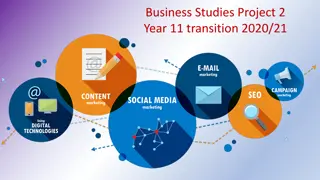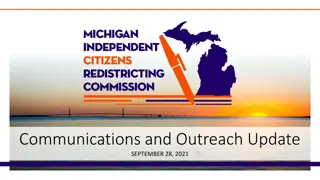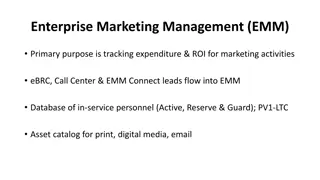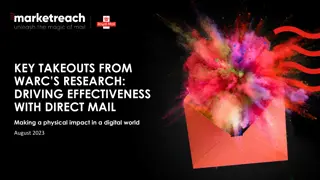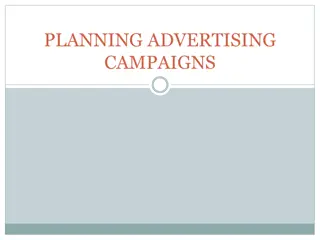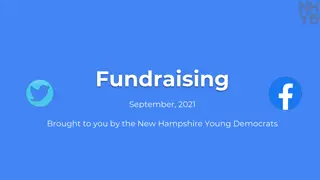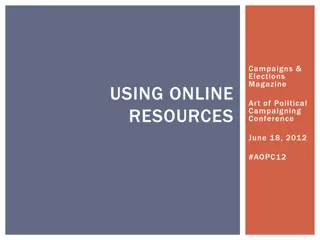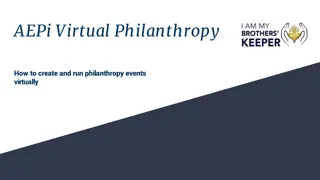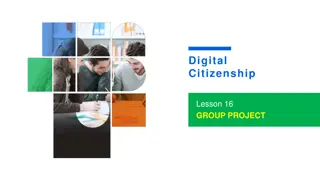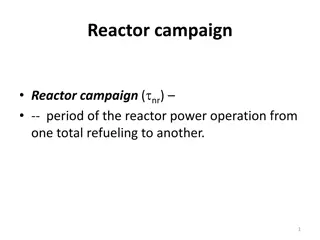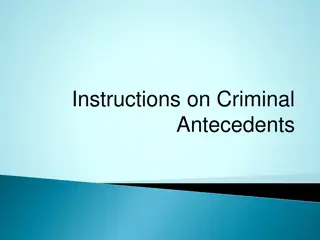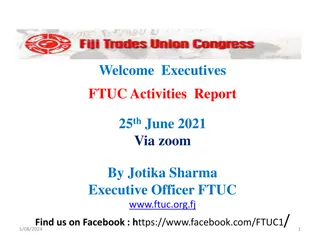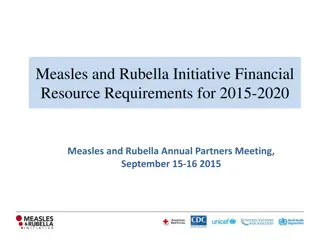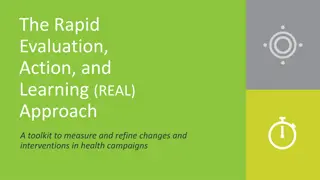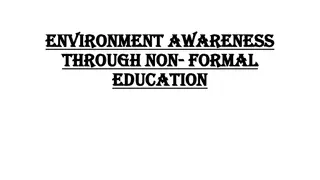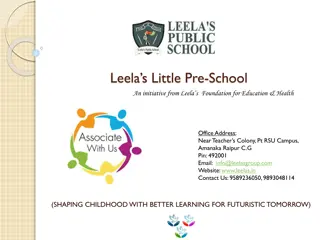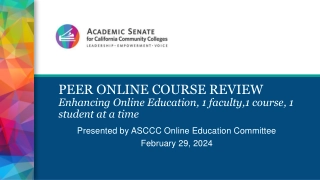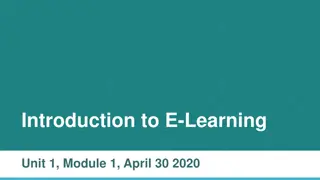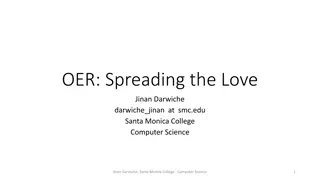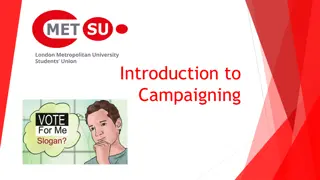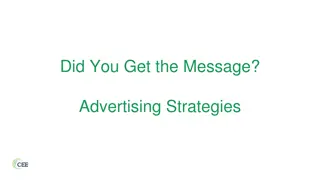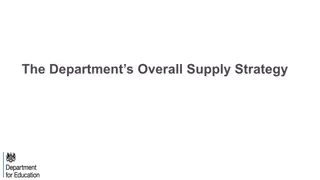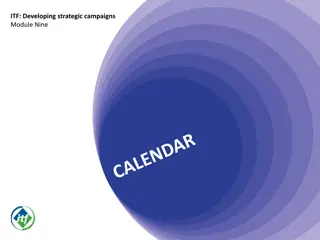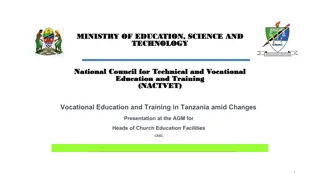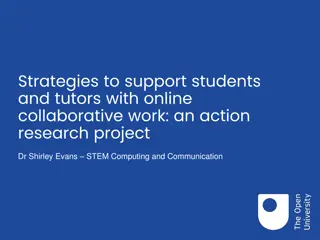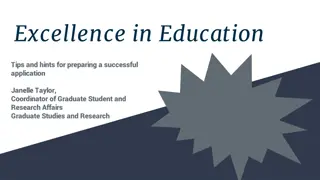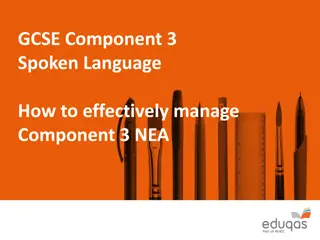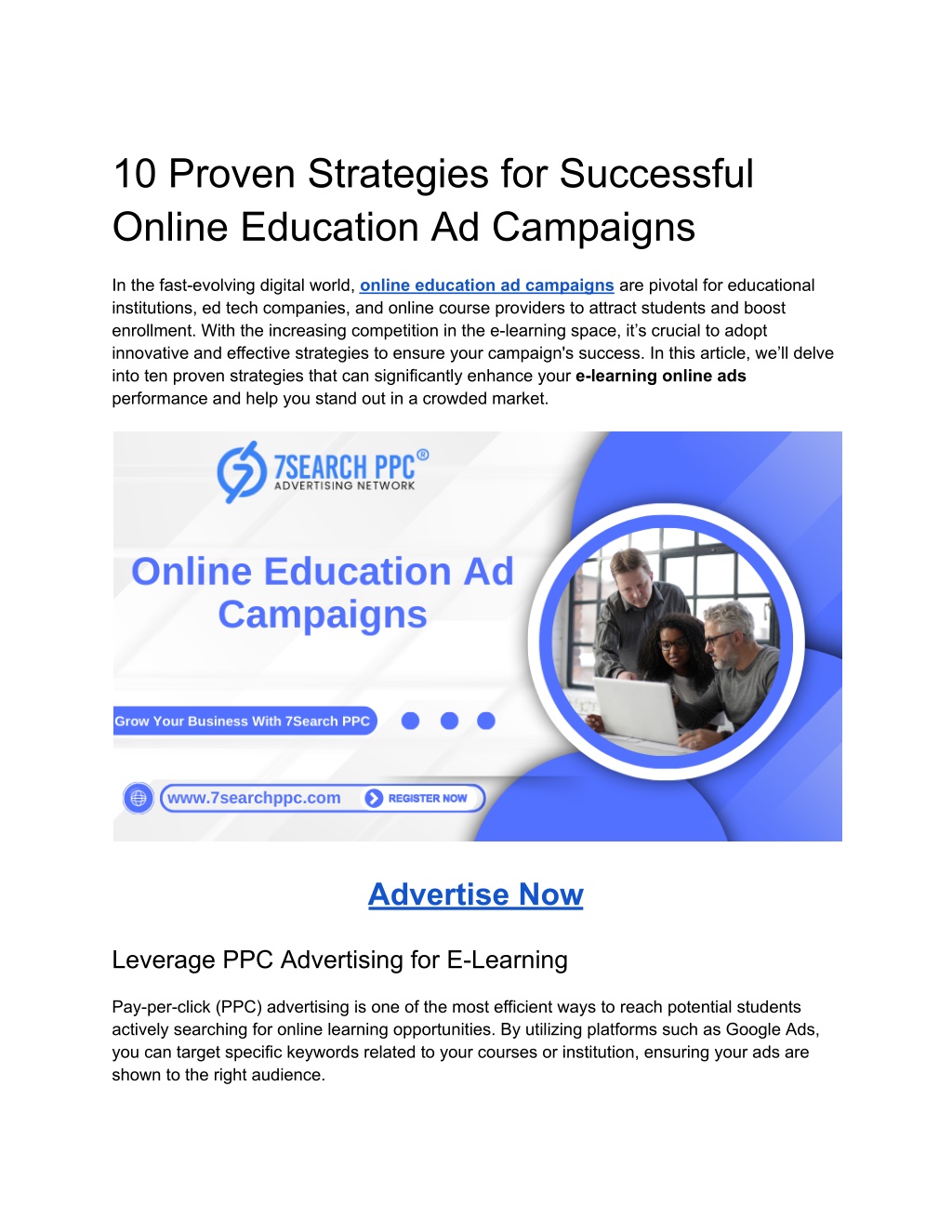
10 Proven Strategies for Successful Online Education Ad Campaigns
In todayu2019s dynamic digital landscape, educational campaigns are evolving as powerful tools to raise awareness, promote learning, and drive engagement in both academic and professional settings. Whether launching online course promotions or craft
Download Presentation

Please find below an Image/Link to download the presentation.
The content on the website is provided AS IS for your information and personal use only. It may not be sold, licensed, or shared on other websites without obtaining consent from the author. Download presentation by click this link. If you encounter any issues during the download, it is possible that the publisher has removed the file from their server.
E N D
Presentation Transcript
10 Proven Strategies for Successful Online Education Ad Campaigns In the fast-evolving digital world, online education ad campaigns are pivotal for educational institutions, ed tech companies, and online course providers to attract students and boost enrollment. With the increasing competition in the e-learning space, it s crucial to adopt innovative and effective strategies to ensure your campaign's success. In this article, we ll delve into ten proven strategies that can significantly enhance your e-learning online ads performance and help you stand out in a crowded market. Advertise Now Leverage PPC Advertising for E-Learning Pay-per-click (PPC) advertising is one of the most efficient ways to reach potential students actively searching for online learning opportunities. By utilizing platforms such as Google Ads, you can target specific keywords related to your courses or institution, ensuring your ads are shown to the right audience.
For effective PPC advertising for an e-learning campaign, focus on: Keyword research: Identify and target high-traffic, low-competition keywords such as "best e-learning platforms" or "online education courses." Ad copy optimization: Create compelling, concise ad copy that highlights your unique selling points (USPs), such as affordability, flexibility, or accreditation. Landing page optimization: Ensure that your landing pages are relevant to the ads, user-friendly, and contain a clear call-to-action (CTA) to maximize conversions. Utilize Retargeting Ads to Re-engage Prospects A significant number of prospective students visit educational websites but don t convert immediately. Retargeting ads allow you to bring these potential learners back to your site by reminding them of the benefits of your e-learning programs. These ads can appear on social media platforms, search engines, or display networks. Retargeting not only improves conversion rates but also builds brand recall. Strategies for effective retargeting ads: Segment your audience based on their level of engagement and create customized ads for each segment. Use dynamic ads that show the specific courses or programs that the user viewed. Offer time-limited discounts or free trials to incentivize users to return. Craft Compelling Video Ads Video content is a powerful tool for capturing attention and delivering complex information quickly. It has a higher engagement rate than other forms of content and is ideal for showcasing the benefits of your e-learning programs. Platforms such as YouTube, Facebook, and Instagram are perfect for distributing video ads targeting specific demographics. Best practices for video ads in online education: Keep videos short (30-60 seconds) but informative, emphasizing the key advantages of your program. Include testimonials or success stories to build credibility and trust. Optimize videos for mobile viewing, as a large portion of the target audience will access content via smartphones. Focus on Native Advertising on Education Platforms Native ads blend seamlessly with the content on a website, offering a non-intrusive way to promote your courses. These ads are particularly effective when placed on native ad platforms
that focus on education-related content. For example, placing native ads on websites that publish articles about career development, self-improvement, or skill-building can drive highly relevant traffic to your site. How to succeed with native ads: Write educational, informative content that naturally incorporates your course offerings. Use visually appealing designs that align with the look and feel of the platform. Test different types of native ad placements to determine which performs best for your audience. Maximize Social Media Ads for Targeted Campaigns Social media platforms like Facebook, LinkedIn, and Instagram allow for precise targeting based on demographics, interests, and behaviors. By running targeted social media ads, you can reach a specific segment of potential students who are more likely to be interested in your programs. Effective strategies for social media ads: Use high-quality visuals and attention-grabbing headlines that speak to your audience's needs. Run A/B tests on different ad formats and messaging to determine what resonates best. Consider using Facebook s lead generation ads to collect contact details for follow-up. Invest in Influencer Marketing Influencer marketing involves partnering with individuals who have a significant following in the education niche to promote your e-learning courses. Influencers can help build trust and credibility with potential students by offering authentic endorsements. Tips for influencer marketing success: Identify influencers whose audience aligns with your target demographic. Develop a mutually beneficial partnership where influencers can test and review your course offerings. Encourage influencers to share personal experiences and success stories with your courses.
Offer Free Webinars to Generate Leads Hosting free webinars is an excellent way to showcase your expertise and build rapport with potential students. Webinars provide a platform for engaging directly with your audience, answering questions, and demonstrating the value of your courses. Best practices for running webinars: Promote your webinar across various channels, including email marketing and social media. Offer valuable insights and actionable advice during the webinar, rather than solely focusing on sales. Include a strong CTA at the end of the webinar, encouraging attendees to sign up for your course or schedule a consultation. Create Search Engine Optimized Content SEO plays a critical role in driving organic traffic to your e-learning platform. By creating high-quality, keyword-rich content that addresses the needs of your audience, you can attract users who are actively searching for online education solutions. SEO content strategies for online education campaigns: Target long-tail keywords like "affordable online business degrees" or "certified data science courses online." Write in-depth blog posts, guides, and tutorials that provide valuable information to potential students. Optimize meta titles, descriptions, and internal linking to boost your site s visibility. Use Geotargeting for Localized Ad Campaigns Geotargeting allows you to focus your ad spend on specific regions or cities where there is a higher demand for your courses. This is particularly useful for institutions that offer both online and hybrid learning options and want to attract local students. How to use geotargeting effectively: Analyze data to identify regions where your programs are most in demand. Create ad copy that speaks to local audiences, including region-specific keywords. Offer location-based promotions or events, such as open days or local meet-ups.
Implement Data-Driven Campaigns Data is crucial for optimizing your online education ad campaigns. By analyzing performance metrics such as click-through rates (CTR), conversion rates, and return on ad spend (ROAS), you can fine-tune your campaigns for better results. Key metrics to track: Cost per acquisition (CPA): How much you spend to acquire a new student. Conversion rate: The percentage of visitors who enroll in a course after clicking your ad. Engagement rate: How users interact with your ads, including clicks, shares, and comments. Optimize for Mobile Advertising In today's digital landscape, more users are accessing the internet via mobile devices than ever before, especially when it comes to searching for educational opportunities. Ensuring that your online education ads are optimized for mobile viewing is crucial to reaching potential students on the go. Key mobile optimization strategies: Responsive design: Ensure that your landing pages are mobile-friendly, with fast load times and easy navigation. Short and compelling messaging: Mobile users tend to scan information, so your ad copy should be concise yet impactful. Click-to-call: Implement a click-to-call feature, allowing potential students to directly contact your admissions team from their mobile device. Mobile-specific ad formats: Leverage mobile-optimized ad formats, such as swipeable ads on Instagram or Snapchat, to engage users more effectively. Highlight Certifications and Partnerships In a competitive market, standing out often comes down to the perceived value of your courses. By showcasing industry-recognized certifications or partnerships with reputable organizations, you can instill confidence in potential students. Best practices for leveraging certifications and partnerships: Include logos of any accredited bodies or partner institutions in your ads. Highlight the certifications students will earn upon completing your courses.
Promote partnerships with well-known companies that offer internships or job placements for graduates. This strategy not only enhances your credibility but also appeals to students who are seeking tangible, career-boosting outcomes from their e-learning experience. Personalize Your Ad Campaigns Personalization has become a key factor in digital marketing success. In the context of online education ad campaigns, personalizing ads based on user data, such as browsing behavior, location, and previous interactions, can significantly increase engagement and conversion rates. How to personalize online education ads: Use dynamic ad content to show personalized course recommendations based on the user s interests or search history. Segment your audience based on demographics, such as age, education level, or career field, and tailor your messaging accordingly. Incorporate personalized CTAs that speak directly to the needs and goals of the individual learner. Personalization fosters a deeper connection with your audience and makes your ads feel more relevant, leading to higher engagement and enrollment. Use AI and Automation for Ad Campaigns Artificial intelligence (AI) and automation are transforming digital advertising, and online education campaigns can benefit significantly from these technologies. AI-powered tools can analyze large sets of data, predict outcomes, and optimize ad placements in real-time. Effective use of AI in online education ads: Automated bidding: Use AI to automatically adjust your bids in PPC campaigns to get the best possible return on investment (ROI). Chatbots for engagement: Implement AI-powered chatbots on your landing pages to provide instant support and guide potential students through the enrollment process. Predictive analytics: Use AI to predict user behavior and optimize ad targeting based on past actions, such as the likelihood of course registration after viewing an ad. By integrating AI and automation into your advertising strategy, you can make data-driven decisions that optimize performance and reduce costs.
Run Cross-Channel Campaigns A multi-channel approach ensures that your ads reach your target audience across various touchpoints. Cross-channel marketing involves running ads on different platforms such as Google, Facebook, Instagram, LinkedIn, and even native ad platforms. This strategy increases your campaign s visibility and ensures that potential students are exposed to your offers multiple times across different environments. How to implement cross-channel marketing for e-learning campaigns: Create cohesive messaging that remains consistent across all platforms. Adjust your ad formats and visuals to suit the characteristics of each platform (e.g., image ads on Instagram, and text-based ads on LinkedIn). Track your performance across channels and reallocate your budget to the platforms that yield the best results. Cross-channel campaigns ensure that your ads are visible to a broader audience, maximizing your reach and driving more traffic to your landing pages. Conclusion In the ever-expanding realm of online education, crafting effective ad campaigns is crucial for attracting and converting potential students. By implementing the strategies outlined in this article, you can enhance your online education ad campaigns and gain a competitive edge. From leveraging PPC advertising for e-learning and utilizing retargeting ads, to personalizing your approach and building strategic partnerships, each tactic plays a vital role in driving engagement and maximizing enrollment. FAQs What is the best platform for PPC advertising in online education? Ans: Google Ads and Facebook Ads are among the most effective platforms for PPC advertising in the online education sector. Google Ads allows you to target specific search queries related to education, while Facebook Ads provides detailed targeting options based on demographics, interests, and behaviors. How can I measure the success of my online education ad campaigns? Ans: To measure the success of your campaigns, track key performance indicators (KPIs) such as click-through rates (CTR), conversion rates, cost per acquisition (CPA), and return on ad spend (ROAS). Utilizing tools like Google Analytics and advertising platform analytics will help you assess the effectiveness of your ads and make data-driven improvements.
What are some effective ways to use retargeting in e-learning campaigns? Ans: Effective retargeting strategies include creating customized ads based on users' past interactions, using dynamic ads to display specific courses they viewed, and offering incentives such as discounts or free trials to re-engage visitors who did not convert initially. How important is mobile optimization for online education ads? Ans: Mobile optimization is crucial as a significant portion of users access educational content via smartphones and tablets. Ensuring that your ads and landing pages are mobile-friendly can improve user experience, increase engagement, and boost conversion rates. What role do influencer partnerships play in online education marketing? Ans: Influencer partnerships can enhance credibility and reach by leveraging the trust and authority of industry leaders or popular figures. Influencers can promote your courses through authentic endorsements, reviews, and testimonials, helping to attract a larger audience and drive enrollments.

